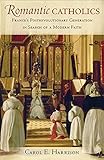Romantic Catholics : France's postrevolutionary generation in search of a modern faith / Carol E. Harrison.
Material type: TextPublication details: Ithaca : Cornell University Press, (c)2014.Description: 1 online resourceContent type:
TextPublication details: Ithaca : Cornell University Press, (c)2014.Description: 1 online resourceContent type: - text
- computer
- online resource
- 9780801470592
- BX1530 .R663 2014
- COPYRIGHT NOT covered - Click this link to request copyright permission: https://lib.ciu.edu/copyright-request-form
| Item type | Current library | Collection | Call number | URL | Status | Date due | Barcode | |
|---|---|---|---|---|---|---|---|---|
 Online Book (LOGIN USING YOUR MY CIU LOGIN AND PASSWORD)
Online Book (LOGIN USING YOUR MY CIU LOGIN AND PASSWORD)
|
G. Allen Fleece Library ONLINE | Non-fiction | BX1530 (Browse shelf(Opens below)) | Link to resource | Available | ocn870273112 |
Includes bibliographies and index.
Introduction : romantic Catholics and the two Frances -- First communion : the most beautiful day in the lives and deaths of little girls -- The education of Maurice de Guérin -- The dilemma of obedience : Charles de Montalembert, Catholic citizen -- Pauline Craven's holy family : writing the modern saint -- Frédéric and Amélie Ozanam : charity, marriage, and the Catholic social -- A free church in a free state : the Roman question -- Epilogue : the devout woman of the Third Republic and the eclipse of Catholic fraternity.
In this well-written and imaginatively structured book, Carol E. Harrison brings to life a cohort of nineteenth-century French men and women who argued that a reformed Catholicism could reconcile the divisions in French culture and society that were the legacy of revolution and empire. They include, most prominently, Charles de Montalembert, Pauline Craven, Amélie and Frédéric Ozanam, Léopoldine Hugo, Maurice de Guérin, and Victorine Monniot. The men and women whose stories appear in Romantic Catholics were bound together by filial love, friendship, and in some cases marriage. Harrison draws on their diaries, letters, and published works to construct a portrait of a generation linked by a determination to live their faith in a modern world. Rejecting both the atomizing force of revolutionary liberalism and the increasing intransigence of the church hierarchy, the romantic Catholics advocated a middle way, in which a revitalized Catholic faith and liberty formed the basis for modern society. Harrison traces the history of nineteenth-century France and, in parallel, the life course of these individuals as they grow up, learn independence, and take on the responsibilities and disappointments of adulthood. Although the shared goals of the romantic Catholics were never realized in French politics and culture, Harrison's work offers a significant corrective to the traditional understanding of the opposition between religion and the secular republican tradition in France.
COPYRIGHT NOT covered - Click this link to request copyright permission:
There are no comments on this title.
